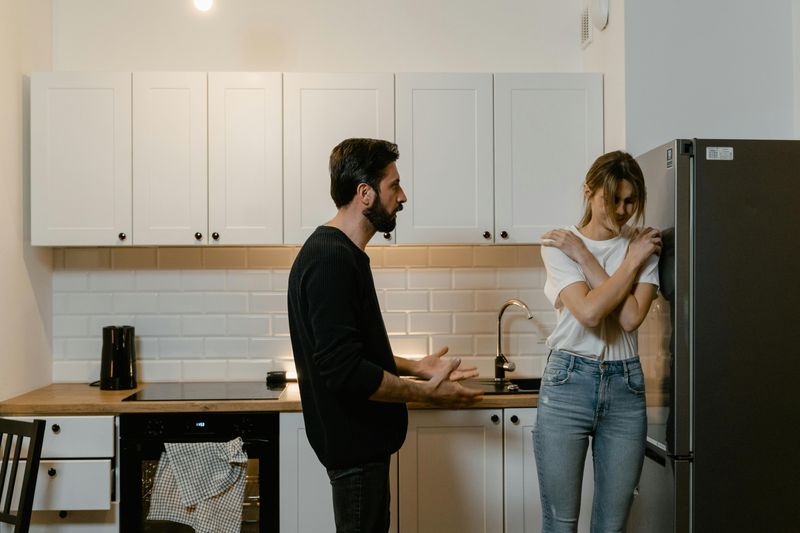12 Signs You’re Stuck in a Codependent Relationship Without Even Realizing It

Relationships should help us grow, not hold us back. Sometimes though, we slip into patterns that aren’t healthy without even noticing. Codependency happens when one person builds their entire world around another, creating an unbalanced connection where personal boundaries disappear. Recognizing these warning signs is the first step toward building healthier relationships where both people can thrive independently while still loving each other.
1. Your Happiness Takes A Backseat To Theirs

Constantly putting your partner’s needs before your own isn’t selfless love—it’s a warning sign. You cancel plans that excite you to accommodate their schedule. Your favorite hobbies gather dust while you spend hours supporting their interests.
The occasional sacrifice is normal in relationships, but consistently abandoning your joy isn’t. When was the last time you did something purely because it made you happy?
Over time, this pattern creates resentment that festers beneath forced smiles. True partnerships involve balance, with both people’s happiness holding equal importance. Your joy matters just as much as theirs.
2. Your Identity Feels Incomplete Without Them

Remember who you were before this relationship? Many people in codependent situations can’t answer that question easily. Your hobbies, friendships, and personal goals have faded into the background while your partner’s life takes center stage.
Friends might comment that you’ve changed, and not always for the better. When asked about your interests, you automatically list your partner’s passions instead of your own.
This merging of identities might feel romantic at first—like you’re truly becoming one. In reality, healthy relationships require two whole people bringing their authentic selves to the table, not one person dissolving into the other’s shadow.
3. Your Voice Goes Silent When Needs Arise

“I’m fine with whatever you want” becomes your automatic response, even when you’re not fine at all. Speaking up about your needs feels selfish or uncomfortable, so you stay quiet while resentment builds inside.
Maybe you’ve convinced yourself that keeping peace matters more than your own happiness. Or perhaps past attempts to express yourself were met with negative reactions, teaching you to stay silent.
The irony? Your partner can’t meet needs they don’t know exist. True intimacy grows when both people feel safe expressing their wants and boundaries. Your needs deserve a voice in your relationship—they always have.
4. Their Approval Dictates Your Choices

The outfit you wear, the friends you keep, even the music you listen to—all filtered through an invisible question: “Will they approve?” This mental checkpoint has become so automatic you barely notice it anymore.
Small decisions paralyze you without their input. You’ve texted photos of potential purchases from store changing rooms, waiting anxiously for their response before deciding.
This constant seeking of validation goes beyond normal consideration. Healthy partners support each other’s autonomy rather than serving as approval machines. Your choices—from the trivial to the significant—belong to you first, not your relationship’s suggestion box.
5. Their Mistakes Feel Like Your Failures

Your stomach drops when your partner makes a poor choice—not just from concern, but from a deep sense that you should have prevented it somehow. Their bad day at work? You wonder if your morning conversation distracted them. Their unhealthy habits? You blame yourself for not being more supportive.
This misplaced responsibility extends beyond normal empathy. You’ve become an emotional sponge, absorbing blame that isn’t yours to carry.
The truth is startlingly simple: adults are responsible for their own actions. Supporting someone doesn’t mean taking ownership of their choices. Releasing this burden isn’t selfish—it’s the foundation of healthy boundaries.
6. Your Loyalty Withstands Disrespect

Loyalty transforms from virtue to vice when it keeps you trapped in harmful situations. Friends raise eyebrows at how your partner speaks to you, but you defend these behaviors as “just their way” or “having a rough time.”
The goalpost for acceptable treatment keeps moving. What would have shocked you early in the relationship now feels normal—the occasional insult, the public put-downs, the dismissed feelings.
Healthy relationships don’t require enduring disrespect to prove devotion. True loyalty includes honoring yourself enough to expect basic respect. Love that demands you accept mistreatment isn’t love at all—it’s dependency wrapped in romantic packaging.
7. Rejection Terror Drives Your Behavior

That gnawing fear lives in your chest—if you don’t measure up somehow, they’ll leave. This invisible threat shapes your actions daily. You avoid certain topics that might create conflict. You apologize for things that aren’t your fault just to smooth tensions.
Physical intimacy sometimes happens not because you desire it, but because you fear rejection if you decline. You monitor their moods obsessively, becoming a relationship weather forecaster trying to predict emotional storms.
Relationships built on fear create perfect prisons—ones where the captive believes they’re choosing to stay. Love shouldn’t feel like walking on eggshells. When fear of abandonment outweighs joy of connection, something fundamental has gone wrong.
8. The Giving Scale Tips Heavily Your Way

Relationships involve natural give and take, but yours resembles a one-way street. You remember their mother’s birthday, but they forget yours entirely. You listen for hours about their work stress, yet they check their phone when you share your struggles.
The imbalance extends beyond emotional support to practical matters too. Your schedule adjusts to accommodate theirs. Your resources—time, money, energy—flow primarily in their direction.
This pattern creates an unsustainable dynamic where you’re constantly depleted. Healthy relationships involve reciprocity, with both partners contributing and receiving. Your needs aren’t excessive—they’re the essential nutrients that keep relationships alive.
9. Escape Seems Impossible Despite Unhappiness

The relationship doesn’t make you happy anymore—maybe it hasn’t for years. Yet when friends gently suggest you consider leaving, panic rises in your chest. “But we’ve been together so long” or “What would I do without them?” becomes your automatic defense.
You’ve created elaborate mental justifications for staying: They need you. Things might improve. The good moments make up for the bad.
This sense of being trapped isn’t about practical obstacles like finances (though those can be real). It’s about identity—you’ve forgotten how to exist independently. Remember: relationships should be choices, not sentences. Your life belongs to you, not your relationship status.
10. Your Self-Trust Has Eroded Away

“What do you think?” becomes a question you can’t answer without consulting your partner first. Your internal compass that once guided decisions has gone quiet, replaced by constant second-guessing.
This erosion happened gradually. Perhaps your judgment was questioned repeatedly, or your perceptions dismissed as overreactions. Now, you doubt the evidence of your own experiences.
When friends point out concerning behaviors in your relationship, you wonder if you’re the problem for feeling hurt. This self-doubt isn’t your natural state—it developed through subtle relationship dynamics. Rebuilding trust in yourself might be the most important work you do, whether you stay or leave.
11. Your Self-Image Blurs Without Them

The thought experiment is revealing: Who would you be if this relationship ended tomorrow? If the question leaves you blank or terrified, your sense of self may have become dangerously entangled with your partner.
You’ve forgotten old passions that once defined you. Friends from your “before” life have drifted away. Even your opinions have subtly shifted to align with theirs for harmony’s sake.
This isn’t just normal relationship adjustment—it’s identity erosion. Healthy love enhances who you are rather than replacing it. Your uniqueness—your perspectives, dreams, quirks—deserves preservation, not as selfishness but as the authentic gift you bring to any relationship.
12. Nervous Energy Replaces Comfort Around Them

Remember when being together felt like taking a deep breath? Now, tension knots your shoulders when they enter the room. You analyze your words before speaking, calculating potential reactions. The sound of their key in the lock triggers a flutter of anxiety rather than happiness.
You’ve developed physical tells of this stress—perhaps stomach problems, headaches, or disrupted sleep before important conversations. These symptoms aren’t coincidental; they’re your body’s alarm system.
Partners should be our safe harbors, not the source of our storms. While all relationships have tense moments, persistent anxiety in your partner’s presence signals something fundamentally amiss. Your nervous system is trying to tell you something important—listen to it.

Comments
Loading…